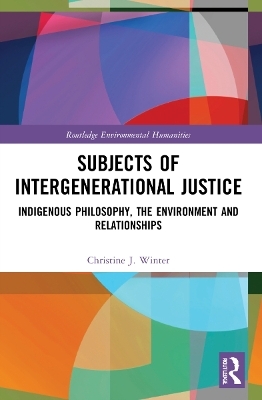
Subjects of Intergenerational Justice
Routledge (Verlag)
978-0-367-56377-6 (ISBN)
This book challenges mainstream Western IEJ (intergenerational environmental justice) in a manner that privileges indigenous philosophies and highlights the value these philosophies have for solving global environmental problems.
Divided into three parts, the book begins by examining the framing of Western liberal environmental, intergenerational and indigenous justice theory and reviews decolonial theory. Using contemporary case studies drawn from the courts, film, biography and protests actions, the second part explores contemporary Māori and Aboriginal experiences of values-conflict in encounters with politics and law. It demonstrates the deep ontological rifts between the philosophies that inform Māori and Aboriginal intergenerational justice (IJ) and those of the West that underpin the politics and law of these two settler states. Existing Western IEJ theories, across distributional, communitarian, human rights based and the capabilities approach to IJ, are tested against obligations and duties of specific Māori and Aboriginal iwi and clans. Finally, in the third part, it explores the ways we relate to time and across generations to create regenerative IJ. Challenging the previous understanding of the conceptualization of time, it posits that it is in how we relate—human to human, human to nonhuman, nonhuman to human—that robust conceptualization of IEJ emerges. This volume presents an imagining of IEJ which accounts for indigenous norms on indigenous terms and explores how this might be applied in national and international responses to climate change and environmental degradation.
Demonstrating how assumptions in mainstream justice theory continue to colonise indigenous people and render indigenous knowledge invisible, this book will be of great interest to students and scholars of environmental and intergenerational philosophy, political theory, indigenous studies and decolonial studies, and environmental humanities more broadly.
Christine J. Winter is a Post-Doctoral Research Fellow with the Sydney Environment Institute and Lecturer in the Department of Government and International Relations at the University of Sydney. Christine's research focuses on intergenerational, indigenous, environmental and multispecies justice and their entanglements. At the heart of her work is an examination of the incompatibilities between Western and Māori philosophies and ways in which theories of justice continue the colonial project. She is interested in creating a space for political theory to actively contribute to the decolonial project required for justice in the settler states.
Chapter 1 Introduction Section 1: Framings Chapter 2: Liberal Approaches to Intergenerational Environmental Justice Chapter 3: The Settler State, Recognition and Power Section 2: Living at the Intersection: Barriers to realising IEJ in settler states Chapter 4: Still Talking Past Each Other: More than homo economicus Chapter 5: You are Never Alone – something more than individual Chapter 6: Growing the Land Up: Listening to Country Section 3 How do we relate? Chapter 7: Walking Backwards into the Future: Something more than now Chapter 8: Regenerative Relationships
| Erscheinungsdatum | 06.09.2021 |
|---|---|
| Reihe/Serie | Routledge Environmental Humanities |
| Zusatzinfo | 1 Tables, black and white; 2 Line drawings, black and white; 2 Illustrations, black and white |
| Verlagsort | London |
| Sprache | englisch |
| Maße | 156 x 234 mm |
| Gewicht | 326 g |
| Themenwelt | Geisteswissenschaften ► Philosophie ► Ethik |
| Naturwissenschaften ► Biologie ► Ökologie / Naturschutz | |
| Sozialwissenschaften ► Ethnologie | |
| Sozialwissenschaften ► Soziologie | |
| Technik ► Umwelttechnik / Biotechnologie | |
| Wirtschaft ► Volkswirtschaftslehre | |
| ISBN-10 | 0-367-56377-0 / 0367563770 |
| ISBN-13 | 978-0-367-56377-6 / 9780367563776 |
| Zustand | Neuware |
| Informationen gemäß Produktsicherheitsverordnung (GPSR) | |
| Haben Sie eine Frage zum Produkt? |
aus dem Bereich


